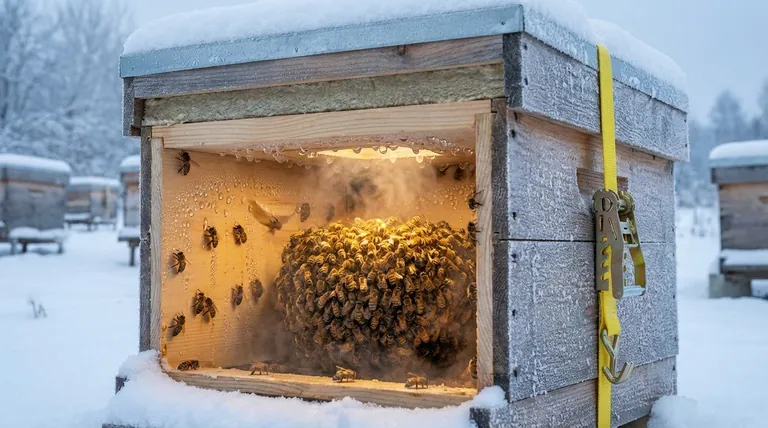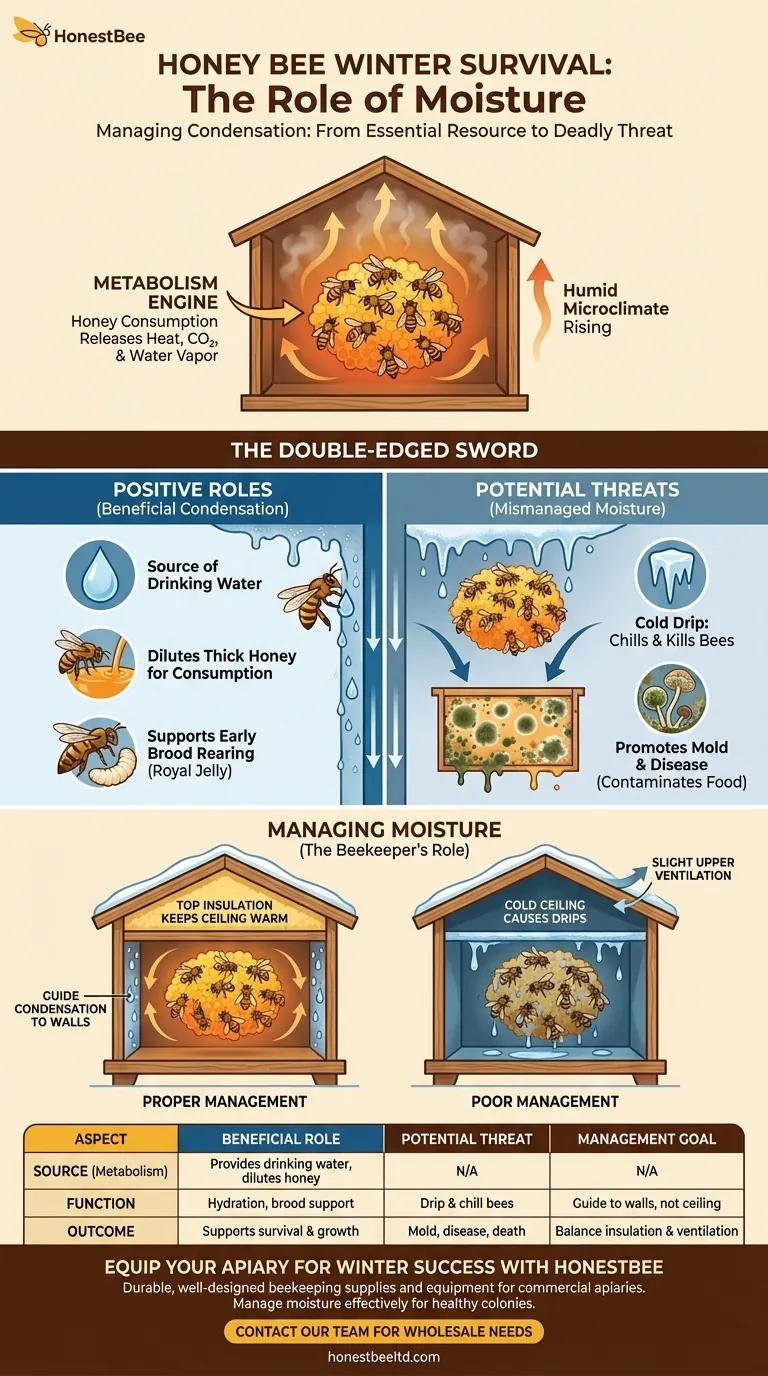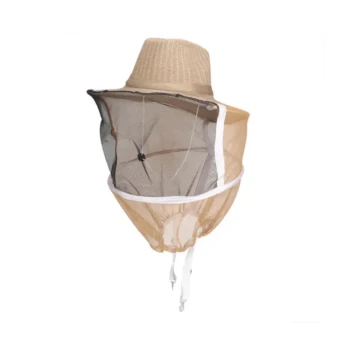In short, moisture is essential for winter survival. Honey bees generate warm, moist air by metabolizing their honey stores. When this vapor condenses inside the hive, it provides the colony with a critical source of drinking water, which they use to dilute thick honey and prepare food for the queen and young brood.
The central challenge of winter beekeeping is not eliminating moisture, but controlling it. A well-managed hive uses condensation as a life-sustaining resource, while a poorly configured hive allows that same moisture to become a deadly threat.

How Bees Generate Essential Moisture
A winter bee colony is a living engine, and like any engine, it produces exhaust. The bees' metabolic process of consuming honey for energy releases heat, carbon dioxide, and, most importantly, water vapor.
The Metabolism Engine
To generate heat and stay alive, the winter cluster of bees must constantly consume their stored honey. This metabolic activity is the fundamental source of all moisture within the hive during the cold months.
Creating a Humid Microclimate
The collective respiration of thousands of bees releases this warm, humid air, creating a pocket of life-sustaining atmosphere. This air naturally rises, carrying the water vapor with it towards the top of the hive.
The Positive Roles of Condensation
When the warm, moist air from the cluster rises and hits a cooler surface inside the hive, it condenses back into liquid water. This process is not a flaw; it's a feature of the bees' winter survival strategy.
A Source of Drinking Water
Bees cannot fly in freezing temperatures to forage for water. The condensation that forms on the hive walls or inner cover becomes their only accessible source of hydration.
Diluting Honey for Consumption
Honey stores can become extremely thick or even crystallize in the cold. Bees collect droplets of condensation and use them to dilute the honey, making it soft enough to consume.
Supporting Early Brood Rearing
If the queen begins laying eggs late in winter, the nurse bees require water to produce the "brood food," or royal jelly, necessary to feed the developing larvae. This internal water source is crucial for raising the first generation of spring bees.
Understanding the Trade-offs: When Moisture Becomes a Threat
While necessary, mismanaged moisture is one of the primary killers of honey bee colonies during winter. The goal is to direct condensation, not let it pool and drip where it can cause harm.
The Danger of Cold Condensation Dripping
The most significant threat is when warm, moist air hits a frigid inner cover directly above the bee cluster. The resulting condensation drips cold water back down onto the bees, chilling them, stressing them, and quickly leading to death. A wet bee in winter is a dead bee.
The Impact of Insulation
Proper top insulation is critical because it keeps the hive's "ceiling" warmer. This prevents condensation from forming directly above the bees and instead encourages it to form on the cooler side walls of the hive, where bees can safely access it without being soaked.
Promoting Mold and Disease
Excessive, stagnant moisture that isn't properly ventilated creates a damp environment. This can lead to moldy combs and frames, which contaminates food stores and creates an unhealthy environment for the colony.
Managing Moisture for Winter Survival
Your goal as a beekeeper is to create a hive environment that mimics the natural processes that allow bees to thrive. This means managing moisture, not trying to eliminate it entirely.
- If your primary focus is ensuring hydration: Trust the bees' natural process of creating moisture, but use hive insulation to guide where that moisture condenses.
- If your primary focus is preventing colony loss: Use top insulation and slight upper ventilation to keep the surface above the cluster warm and dry, forcing condensation to run down the sides of the hive where it is a resource, not a hazard.
Ultimately, successful wintering depends on balancing insulation and ventilation to harness the life-giving properties of moisture while preventing its deadly effects.
Summary Table:
| Aspect of Moisture | Beneficial Role | Potential Threat |
|---|---|---|
| Source | Metabolic byproduct from honey consumption | N/A |
| Function | Provides drinking water; dilutes honey for food | Can drip and chill bees if condensing above the cluster |
| Management Goal | Guide condensation to hive walls as a resource | Use top insulation to prevent dangerous dripping |
| Outcome | Supports hydration and early brood rearing | Prevents mold, disease, and colony death from chilling |
Equip Your Apiary for Winter Success with HONESTBEE
Winter colony loss from moisture is a major challenge for commercial beekeepers. The right equipment is your first line of defense. At HONESTBEE, we supply durable, well-designed beekeeping supplies and equipment that help you create the optimal hive environment.
Our wholesale-focused operations provide commercial apiaries and distributors with the reliable insulation, ventilation solutions, and hive components needed to manage moisture effectively, keeping your colonies healthy and productive through the coldest months.
Protect your investment and ensure your colonies thrive. Contact our team today to discuss your wholesale needs and discover the HONESTBEE difference.
Visual Guide

Related Products
- Professional Galvanized Hive Strap with Secure Locking Buckle for Beekeeping
- Wholesales Dadant Size Wooden Bee Hives for Beekeeping
- Long Langstroth Style Horizontal Top Bar Hive for Wholesale
- Yellow Plastic Bucket Pail Perch for Beekeeping
- Inner Beehive Cover for Beekeeping Bee Hive Inner Cover
People Also Ask
- How can a beehive be physically secured against harsh winter weather? Expert Winterizing Strategies for Your Apiary
- What are the types of Emlocks available? Choose the Right Strap for Hive Security
- What is the advantage of using cam buckle straps? Secure Your Load Fast with Simple, Safe Tensioning
- What are hive straps and why are they used? Secure Your Hives Against Wind, Predators, and Transport
- Why are hive straps important for beekeepers? Secure Your Hives Against Wind, Predators & Transport



















